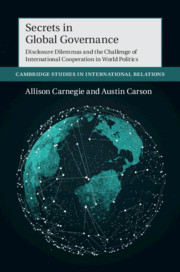Book contents
- Frontmatter
- Contents
- Figures
- Tables
- Acknowledgments
- 1 Introduction
- 2 Theory
- 3 Sensitive Information in Global Governance: The Past and the Present
- 4 Nuclear Proliferation
- 5 International Trade
- 6 War Crimes
- 7 Foreign Direct Investment
- 8 Conclusion
- References
- Index
- Cambridge Studies in International Relations
8 - Conclusion
Published online by Cambridge University Press: 05 June 2020
- Frontmatter
- Contents
- Figures
- Tables
- Acknowledgments
- 1 Introduction
- 2 Theory
- 3 Sensitive Information in Global Governance: The Past and the Present
- 4 Nuclear Proliferation
- 5 International Trade
- 6 War Crimes
- 7 Foreign Direct Investment
- 8 Conclusion
- References
- Index
- Cambridge Studies in International Relations
Summary
In Chapter 8, we discuss the downstream impliactions of our argument and its scholarly, practical, and normative contributions. We first return to the themes of transparency and power, and assess our empirical findings and the related research. We analyze how the presence of a confidentiality function in an international organization (IO) may influence power dynamics and institutional transparency, and derive implications for understanding how IOs can manage such tensions. We also synthesize lessons from existing research on path dependence as well as findings from our four empirical chapters to reflect on the likely origins and decline of confidentiality systems. The chapter then discusses the broad relevance of our theory for other empirical domains and briefly reviews extensions to peacekeeping, international finance, cybersecurity, and environmental issues, which suggest the wide applicability of our framework. We conclude by analyzing the implications of our claims for scholarship on international politics.
- Type
- Chapter
- Information
- Secrets in Global GovernanceDisclosure Dilemmas and the Challenge of International Cooperation, pp. 263 - 293Publisher: Cambridge University PressPrint publication year: 2020

